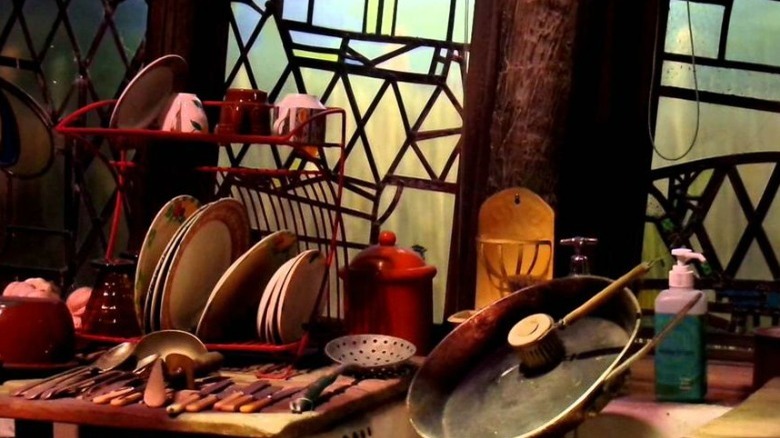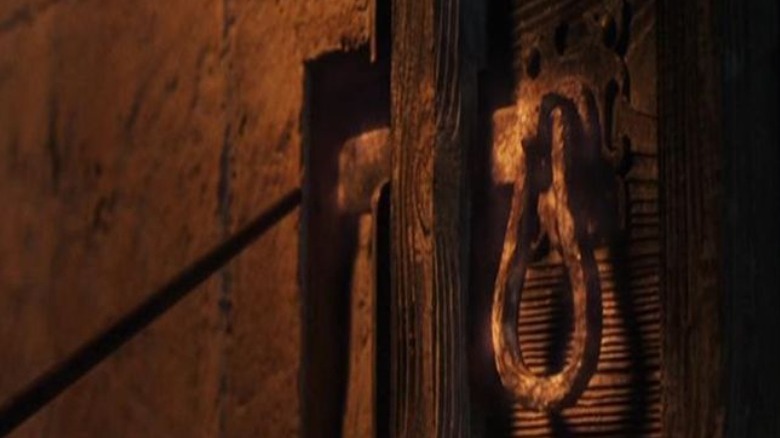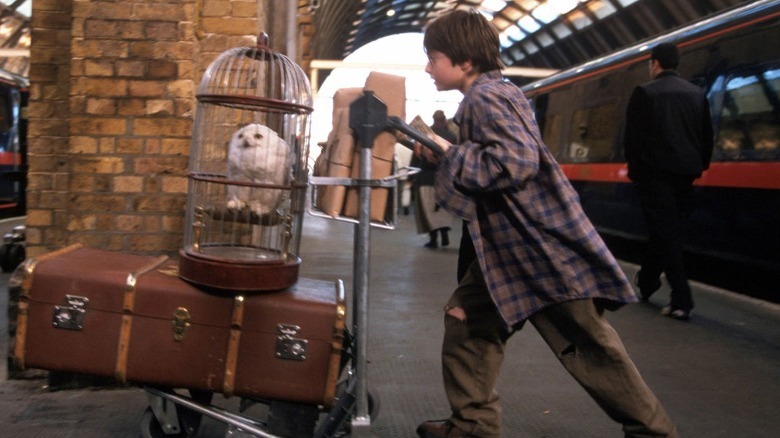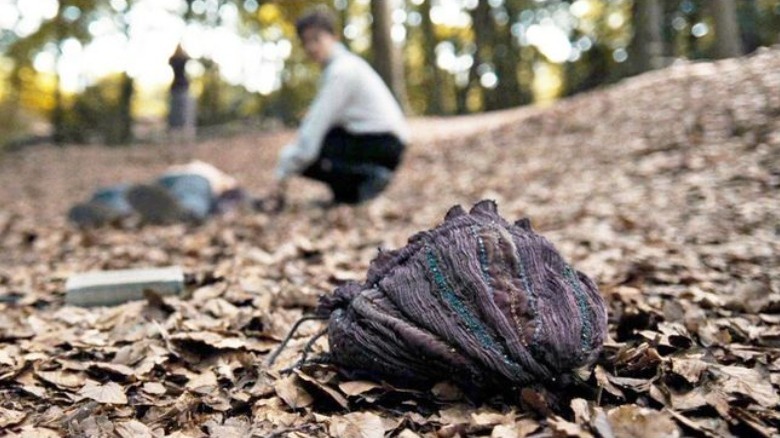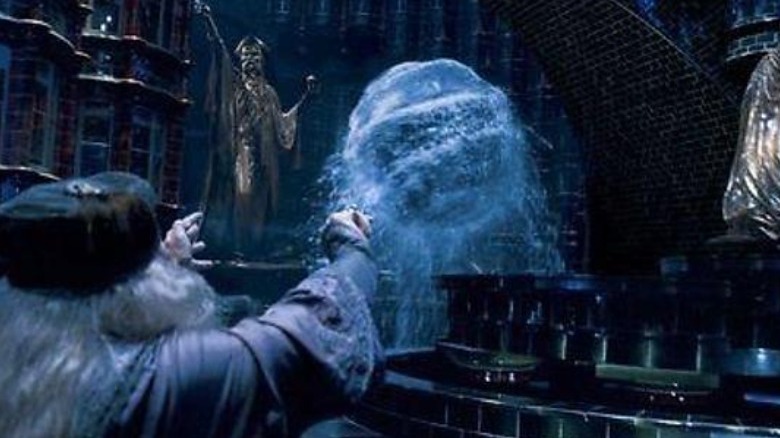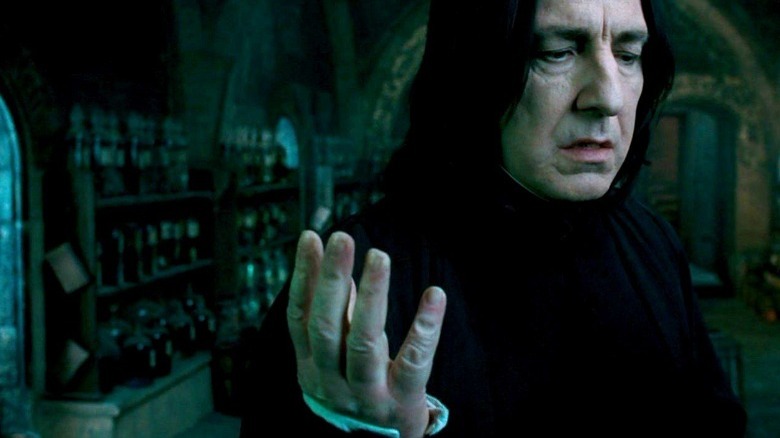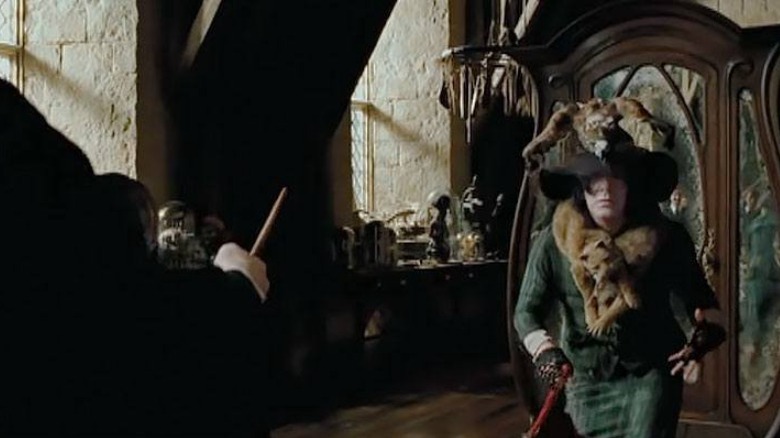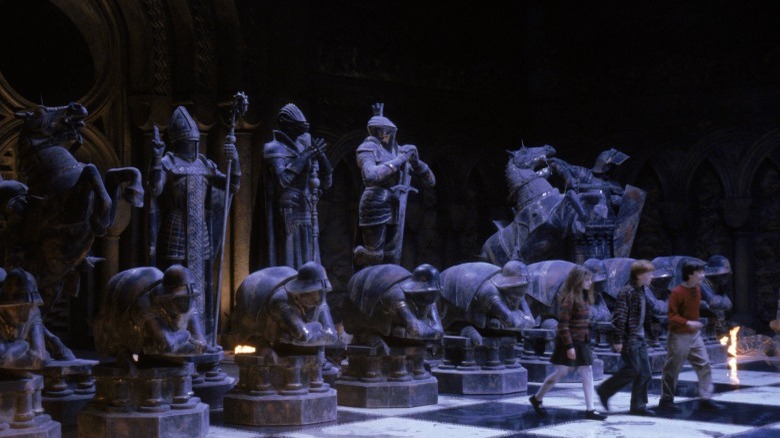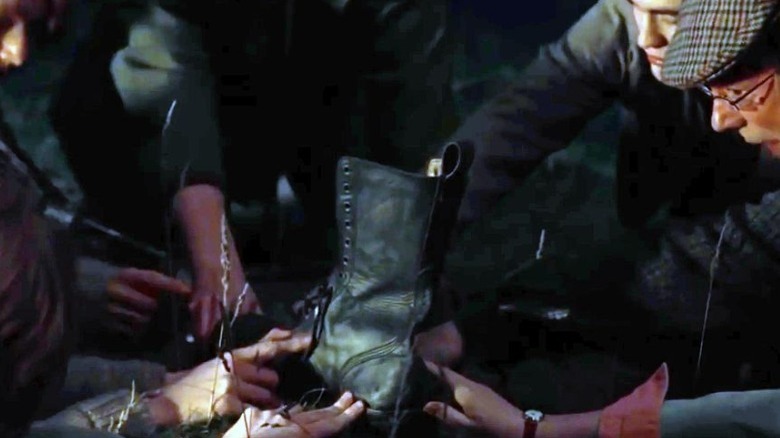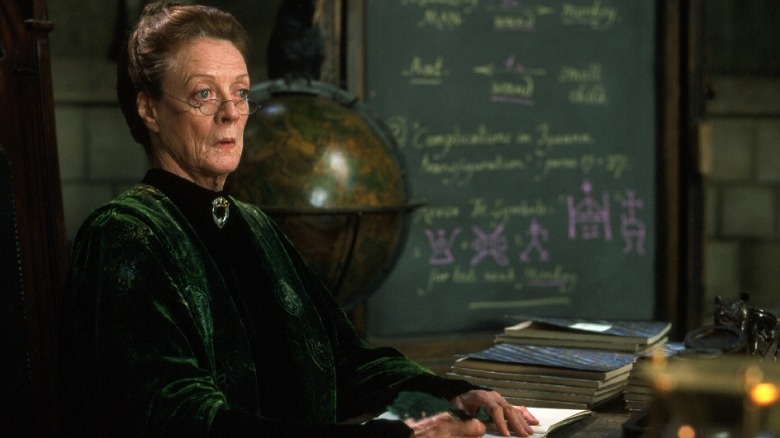The Best Use Of Magic In Harry Potter Ranked
The wizarding world of Harry Potter is filled to the brim with oddities, surprises, and an endless array of colorful characters. Of course, Harry Potter wouldn't be the icon that he is without magic. In his world, magic rules the day and wizards have had to set rigorous boundaries and restrictions on the usage of the powerful tool in order to ensure order is maintained.
Magic, however, can take many shapes and forms. It's not always as simple as reciting a few words with the wave of a wand. Some beings, like shapeshifters, can perform magic internally; alchemy can also be the source of some of the world's most explosive magic. Charms, potions, herbology, and countless other categories of magic are all available to the wizard willing to put in the effort to gain the knowledge.
Magic also doesn't always have to be used for some epic purpose and be an absolute display of grandeur. Often, wizards in the world of Harry Potter use magic for practical purposes. If magic were available to you, wouldn't you put it to use in everyday life? Who wouldn't want a bit of extra help taking care of household chores or smoothing out the rough edges of the daily grind at work? The mystical powers at every wizard's fingertips have a wide array of uses for the capable magic user. Let's take a look at some of the best uses of magic in the "Harry Potter" franchise, ranking them from worst to best.
Cleaning objects
Capable wizards have a litany of cleaning spells at their disposal. After all, who wants to clean dishes, dust, vacuum, and do other household chores? The scouring charm known as "Scourgify" cleans individual objects, making it a perfect choice for grimy or dusty objects around the house needing a good scrubbing. Now, if you wanted to get all "The Sword in the Stone" on your dishes like Merlin in the 1960s Disney animated film, you can force the dishes to wash themselves. Molly Weasley is known to use this spell to clean her family's dishes. She often counsels her son, Ron, to learn cleaning spells to help him with his chores. Like a typical teenager, he always seems a bit oblivious.
The incantation "Tergeo" can lift stains, liquids, dust and dirt particles, and other foreign elements from any surface. It's basically giving an object a good wipe-down without actually wiping. Both Harry and Ron have used the spell to clean dust and grease from objects like photographs.
Making fire
Ever since mankind first discovered fire, it has become an invaluable asset to our existence. While we might take it for granted, we don't casually stop on a daily basis to think about how it fuels our homes and automobiles. Imagine being able to conjure fire at will without the need for sparks, friction, or accelerant. "Incendio" is the fire-making charm wizards use to produce a flame.
Throughout the history of Harry Potter, countless wizards are documented using the charm including Albus Dumbledore, Minerva McGonagall, Severus Snape, several within the Weasley clan, Rubeus Hagrid, Hermoine, Harry himself, and many more. The spell is, of course, a favorite used during intense wizard duels. However, it's typically used when objects necessitate burning, or the need for warmth and light arises. Unfortunately, many, including Hagrid, lost their homes and possessions due to the acolytes of Voldemort committing unfettered arson in an attempt to assault or terrorize Harry and his allies.
Unlocking and locking doors
For the more competent magic users, a sturdy lock (as the 1970s funk band Chocolate Milk would say) ain't nothing but a thing. In fact, it's worth wondering why locks even exist at all in a place like Hogwarts if they could simply be bypassed with a spell or charm. However, for Harry, a wizard among muggles, locking and unlocking doors on the fly could be rather useful.
The locking spell "Colloportus" is seen being used multiple times throughout the Harry Potter saga by several different casters. Often times, even the most expert magic users like Severus Snape are capable of casting this spell non-verbally. The unlocking charm known as "Alohomora" can be used to open locked passages, windows, or other forbidden vaults. Hermoine Granger casts the charm multiple times during her stay at Hogwarts as the trio of friends unlock forbidden areas of the castle. Who needs a pesky house key, when all you need is a bit of magical know-how?
Pitching a tent
For the avid camper, "Erecto" may be one of the most useful magical spells yet, as one can pitch a tent in the blink of an eye. While such a statement might elicit a chuckle, it is. not innuendo. When Harry, Hermoine, and Ron are out in the wilderness hunting for Voldemort's horcruxes, this very spell came in handy. Outside of the Quidditch World Cup in "Goblet of Fire," many were camped in tents that would have been chaos had they all been muggles struggling to set up camp.
Just think, constructing a tent can get rather messy with all of those rods, tarps, and coverings; it always seems simple on the surface, but can get out of control quickly. Hermoine had the right idea. Thankfully, she is the smartest and most studious wizard in the group, always working smarter, not harder.
Eliminating eavesdropping
We've all done it — divulged something sensitive while unintended listeners lurk close by. Eavesdropping often leads to fun, juicy gossip for some and potential embarrassment for others. That can all be avoided, however, with the simple charm known as "Muffliato."
This charm allows individuals to speak without others being able to hear the conversation. Why can't they hear the conversation, you might ask? Well, it's because their head is filled with a terrible noise drowning out any sensitive discussions occurring. Often, the charm is cast on objects (like a door to the room where the secretive conversation is taking place), and keeps those on the outside from listening in. In the world of Harry Potter, enemies are always lurking around the corner or hiding in plain site under the guise of a different alias. The secrets shared between confidants in the saga are usually a matter of life and death. Regardless of the severity, It's certainly a useful tool that would help anybody maintain the privacy they desire.
Shrinking objects and packing them
Have you ever run out of room or storage space and been forced to declutter? Well, if you were a wizard, that wouldn't be much of a problem.
Shrinking objects is as simple as using the "Reducio" charm. In Harry Potter, this charm has been used for multiple purposes, including shrinking threatening creatures like massive spiders or even counter-acting the engorgement charm ("Engorgio") that simply makes objects larger. But, if "Reducio" was ever to be used in conjunction with the packing charm "Pack," one could take organizing luggage for a long trip to the next level.
The packing charm forces items to stuff themselves into luggage. Add an extension charm to the mix, and you could pack an entire city block. Many of us tend to pack the entire house when leaving town, and packing luggage often feels daunting. It's a wonder that wizards aren't completely out of shape, with magic always being available to do the dirty work for them.
Making more space in a small structure
If you're claustrophobic or have ever felt cramped, there's a simple solution in the world of wizardry. The charm known as "Capacious Extremis" would increase the internal capacity of a structure or object without increasing its exterior dimensions. Fans of Dr. Who know exactly what this is like every time audiences set foot inside of the famous Tardis. Many items within Hogwarts are already equipped with the charm — including students' storage trunks, so they could fit an unending number of items inside. Cars, tents, and other structures were seen to have been vexed with this charm in the JK Rowling books. Even Hermione's small bag is a never-ending pit of stuff, including a full-sized tent.
While it is obviously helpful in many ways and a brilliant use of magic, it's highly regulated in the world of Harry Potter. In fact, it's unlawful to use the charm for personal use. The Ministry of Magic must approve its usage because of the potential it has for accidentally revealing wizarding magic to muggles. Someone must have ruined the privilege for the rest of wizards. Sometimes we just can't have nice things.
Making water
Equally as important, if not more so, is the ability to produce water. Imagine what the world would be like if the life-giving substance was abundant and at the will of a magician's command. It'd certainly put water purification, and countless other businesses at risk. The incantation aptly named "Aguamenti" produces a stream of water that could be invaluable on many occasions — like, for instance, combatting the fires emanating from the wands of Voldemort's followers.
However, striking it out into the wilderness like Harry, Hermoine, and Ron do in search of Voldemort's horcruxes becomes less intimidating when one doesn't have to worry about water sources for sustenance. While it may be one of the most practically useful skills on this list, it's not quite as cool as many other magical uses. But with tents potentially vexed with an extension charm like "Capacious Extremis" and having fire and water at will, any wizard could live the good life alone away from civilization.
Disarming someone
We live in a sometimes-dangerous world, and many times, the idea that we could remove someone's ability to harm another is a fantasy. However, Harry Potter and his peers are taught the key to disarming opponents, which is typically depicted as relieving an opposing wizard of their wand. The spell "Expelliarmus" renders an unprepared assailant harmless, with the exception of an all-out physical assault that could be easily tempered in the magical world of Harry Potter.
Of course, while this spell seems like a wonderful use of magic, it can also be employed for sinister purposes. More skilled wizards with evil desires can remove their opponents' means of protecting themselves with the use of this spell. Harry Potter and his friends at Hogwarts have witnessed this personally. So, the spell's existence is a bit of a catch-22.
Turning the scary into something funny
Unfortunately, the existence of wizards, elves, and mystical beasts also means that the potential for very frightening and hostile entities is rather high. Professor Remus Lupin of the Defense Against the Dark Arts class in Harry's third year at Hogwarts introduces his students to the boggart. This evil entity doesn't hold back in its assault of victims. It strikes terror in the hearts of all who see it, simply by realizing its victim's worst fear (making it perhaps the scariest creature in "Potter" lore.
Of course, Professor Lupin wouldn't be a great teacher if he wasn't also about to show his class how to combat the creature. When cast properly, the spell "Riddikulus" forces a boggart to be just that – something ridiculous. It turns the scary into something humorous, ultimately removing the creature's power over his victims. It'd certainly be nice if we could truly transform our fears into a few laughs.
Creating a protective shield
As a wizard, one must always be on their toes. Defensive measures must be in every magic user's bank of knowledge, especially while the conniving Voldemort is still alive and well. Therefore, it behooves most to add a reflexive protective shielding spell to their repertoire. The incantation "Impervius" doesn't grant immunity to anything and everything hurling your way. However, it will protect you from elements such as fire and water.
In the world of practical usage, imagine having a built-in windshield wiper that could constantly keep the rain off your glasses (which Harry utilizes during the rainy weather in a quidditch match). Or, imagine waterproofing all of the electronics in your home with this charm. Want to surf the web on your laptop while in the bath? Sure, no problem. No dangers or accidents will befall you. Enchanting objects to repel moisture, fire, and other elements would be a ridiculously handy tool in the average household.
Repairing objects
Are you an electrician or a plumber? Or perhaps a homemaker or mechanic? If you're a wizard, none of those skillsets are necessary. Not only that, but the requirement for paying the high costs of repair labor are now a fleeting dream. The charm with the incantation stated as "Reparo" can repair almost any broken object completely back to normal functions. The only items that are known to cause a problem are ones destroyed by powerful magic or curses. But when used practically for everyday living, that is likely a rarity.
Hermoine utilized this charm on multiple occasions, repairing accidental damage caused by the trio of friends, or to simply practice her magic. Harry also used it to repair old textbooks, a bowl in Herbology class, and most importantly, to repair his own wand using the legendary Elder Wand. There's little need for repairmen or custodians at Hogwarts.
Bringing statues to life to stand guard
In the world of Harry Potter, an extra set of helping hands is always necessary when dealing with magic. After all, the forces of evil behind Lord Voldemort are formidable and often seek to overwhelm their adversaries in the heat of the moment. Hogwarts is littered with statues who are capable of many feats should a wizard choose to utilize their strength. In "Harry Potter and the Sorceror's Stone," one of the tests of skill and willpower that preceded obtaining the coveted stone was a life-size chess board. Harry, Hermoine, and Ron all had to play the game and win the day in order to proceed. The allied and opposing chess pieces were all statues that had been bewitched by Professor McGonagall as a means of protecting the Philosopher's Stone.
Minerva McGonagall would later use the same spell (known as "Piertotum Locomotor") to assemble the suits of armor and statues in the halls of Hogwarts to fight in defense of the school as Lord Voldemort ordered his loyal followers to descend upon the castle in an effort to prevent Harry from destroying a Horcrux. Having an extra pair of eyes and hands that are ready to fight could be one of the best uses of magic ever demonstrated. There'd be no need for expensive surveillance equipment or feeding, training, and caring for guard dogs.
Teleportation
Whether you drive a car or choose to cope with public transportation, teleportation would be a true delight. Often, much of our time is consumed by simply traveling from one place to the next. But that'd all change if a Portkey spell actually existed outside of the realm of wizardry. This spell offers would-be travelers the gift of turning an average object into a Portkey. This enchanted object then allows the magic user to travel to any specific location.
The downside to this method of travel is that it apparently has adverse effects. It can often cause nausea for the uninitiated or those with a sensitive stomach. If you aren't prepared, the landing could be a bit rough. The Weasleys demonstrate the use of a Portkey to Harry Potter when traveling to the Quidditch World Cup. Who wouldn't take their chances with possible nausea or a few bumps and bruises for a quick trip across the world?
Shapeshifting
Properly known as transfiguration, let's call it what it is: shapeshifting. There are many branches of transfiguration in Harry Potter lore. The most common deals with transforming an object into another. While it maintains many of its original properties, its appearance can be altered to conceal the object's true nature. It is often considered to be one of the most difficult forms of magic, one that takes both skill and knowledge regarding what is and isn't possible. The Animagus is a form of transfiguration in which a wizard is able to transform into an animal. Harry Potter teaches us that this is actually what werewolves are, individuals who have an Animagus. Professor Lupin is one such werewolf.
The Switching spell is another form of transfiguration, which allows two people to switch appearances and traits. Some wizards can even transform into inanimate objects, like Slughorn's ability to transform into an armchair. There are a massive range of options and abilities in the realm of transfiguration, all requiring different levels of skill and expertise.

